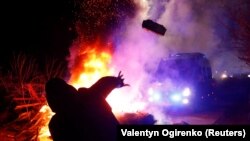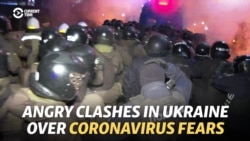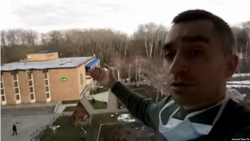In an apparent attempt to change the narrative about Ukraine’s response to the coronavirus crisis, Ukrainian President Volodymyr Zelenskiy has blamed a violent February 20 protest against evacuees from China on a supposed plot to incite chaos and destabilize Ukraine. As yet, the government has presented no evidence for Zelenskiy’s claims.
Angry protesters in the village of Novi Sanzhary, located about 353 kilometers southeast of the capital, Kyiv, set fires and clashed with police to try and stop a bus convoy of 45 Ukrainian and 27 foreign evacuees from the COVID-19 virus’ epicenter, Wuhan, China, from crossing a bridge and driving to a local sanitorium where the evacuees were to be quarantined.
To date, all but one of the 24 people detained during the violence have been released. Prosecutors have opened a criminal investigation into the incident, which left “over 10” police officers “badly injured,” before the protest was dispersed, according to the Interior Ministry.
Protesters told Ukrainian media outlets that they feared the evacuees would infect their families and pollute the drinking water. To date, no case of the COVID-19 coronavirus has been registered in Ukraine.
In response, Prime Minister Oleksiy Honcharuk, Interior Minister Arsen Avakov, Health Minister Zoriana Skaletska, and Poltava administration head Oleg Sinegubov traveled to Novi Sanzhary to urge calm, while President Zelenskiy stressed that “all that’s possible and impossible has been done” to protect Ukraine from the virus.
But the Ukrainian leader’s February 21 allegation about an attempted provocation against his government underlines the extent to which Kyiv believes that it is also fighting a virus of deliberate disinformation. With world headlines trumpeting the Poltava protest and the United Nations condemning the disturbance, the government appears eager to reset the message about Ukraine’s response.
Speaking in a video posted on the Ukrainian presidential office’s Facebook page on the evening of February 21, Zelenskiy asserted that “We know that someone intentionally and deliberately sowed panic among people and then incited this savagery.”
Addressing “all the directors of this underwhelming theater,” he indicated that the alleged provocateurs, who supposedly appeared as “internationally known virologists in track suits,” also participated as “respected agrarians” in recent protests against the legalization of land sales.
He stated that “the clients and the organizers” of the protest will be punished.
“All photos and TV cameras have pinpointed the faces of many people who organized the mass disorder,” Zelenskiy claimed.
Pressed for evidence to support the president’s accusations, Deputy Interior Minister Anton Herashchenko mentioned only “an enormous” amount of information from social media and statements by “certain political groups.”
“When all the information will be analyzed, then there will be an announcement,” Herashchenko said in an interview on Current Time’s February 21 Evening newscast.
Nonetheless, the deputy interior minister hinted broadly that the government is considering that some opposition members are to blame for the unrest. In “a sensible country,” he observed, the opposition does not “work to destroy the state.”
“We see that some political forces in our country work on the principle of ‘The worse, the better,’” he said, without elaboration.
Aside from Novi Sanzhary, small protests also occurred in a few other regions on February 20. In a village in the western region of Ternopil, protesters set up checkpoints outside a local hospital, burned tires, and prayed, in the words of one woman, “that the evacuees from China will be kicked out,” Zaxid.net reported.
Since then, no further protests have occurred in Novi Sanzhary, a village of about 9,000. A few hundred police and National Guard officers are maintaining order there, according to Deputy Interior Minister Herashchenko.
Rather than provocateurs, however, local officials and some residents have blamed the unrest on a lack of advance notice from the central government about the evacuees’ arrival.
One Ukrainian journalist agreed. Protesters in Novi Sanzhary and elsewhere “simply don’t understand” the quarantine, said Sonya Koshkina, editor-in-chief of the news site LB.ua. “They don’t understand because they don’t know. They don’t know because no one has been explaining to them.”
Kyiv-based social psychologist Valeria Zhovtyanskaya also believes that sensationalist news headlines about “a deadly virus from China” helped spark “the panic” in Ukraine.
“People are constantly under the impact of this information,” she said. “It seems more real to them than what objectively is taking place because, unfortunately, they often don’t critically evaluate this information.”
Although President Zelenskiy has acknowledged that genuine fears prompted locals to try and block the road to the Novi Sanzhary sanitorium, senior officials clearly believe that manipulation lies at the root of these fears.
Asked about the government’s attempts to inform Ukrainians about the evacuation ahead of time, Deputy Interior Minister Herashchenko noted that Interior Minister Avakov had explained the procedure on “one of the country’s most popular talk shows,” Svoboda Slova (Freedom of Speech), four days before the evacuees’ arrival.
Prime Minister Honcharuk on February 21 attributed the violence in Novi Sanzhary to “the information war, which continues inside our country and outside.”
On February 20, Ukraine’s Security Service (SBU) stated that an email, masquerading as a Ukrainian Health Ministry missive, had distributed “fake information” about five supposed coronavirus cases in Ukraine. The email went out to the ministry’s complete contact list, BuzzFeed News reported. Ukrainian security specialists are looking further into the email, reportedly dispatched via a “foreign postal service,” according to the SBU.
Deputy Interior Minister Herashchenko stated, however, that no foreigners had been detained in connection with the Novi Sanzhary violence.
Within the village the day after the protest, many residents who opposed the demonstration declined to talk on camera. Some Ukrainians, though, have used their own experience of displacement to interpret the evacuees’ situation.
On February 20, a group of Internally Displaced Persons from separatist-controlled Donetsk, travelling in a mini-bus from the eastern city of Kharkiv, brought boxes of oranges, apples, and Coca-Cola to the Novi Sanzhary sanitorium’s gate.
“We’re all residents of Ukraine and we all live in one country,” said a middle-aged woman wearing a red medic vest.
A ring of National Guard officers now surrounds the sanatorium, which is owned by the National Guard, a body of soldiers serving under the Interior Ministry. No visitors are allowed inside the facility.
One journalist for the national TV channel Ukraine, however, has joined the evacuees for their two-week quarantine, after traveling with them from Wuhan.
Showing Current Time his no-frills room at the sanitorium, Oleksandr Makhov reported that none of the group has any symptom of illness or, despite the attacks on their buses, any sign of panic.
“Basically, everyone is tired. People want to rest and pull themselves together after such a long trip,” he said.
Locals throwing stones at their bus, however, shocked some of the crew who flew the 92 evacuees to Ukraine and saw their trip as “a rescue mission,” said Makhov, who traveled in the crew’s bus to Novi Sanzhary.
Receptions in Kyiv's Boryspil Airport and in Kharkiv, where the group transferred to buses for the roughly three-hour trip to Novi Sanzhary were warm, though. “Everyone understands that there are people who succumbed to some kind of influence and met us this way,” Makhov said.
“They understand that it’s not all of Ukraine that met them like this,” he added.
Following the protest, Health Minister Zoriana Skaletska pledged to stay with the evacuees during their 14-day quarantine, but will reside in a separate building.
Inside the Novi Sanzhary sanitorium, each resident has a five-liter bottle of water, an “enormous quantity” of single-use surgical masks, antiseptic hand wash, and, for those who did not have them already, Ukrainian SIM-cards, Makhov said. Rooms come also with a TV and Internet access.
Breakfast, delivered in individual packets by National Guard medics, is hearty: buckwheat gruel, sausages, beetroot salad, two cheese-and-egg sandwiches, and juice.
Unlike in some other countries’ quarantine facilities, visiting other residents’ rooms is allowed. But leaving the facility to walk in the grounds is banned. Instead, each room has a balcony for getting fresh air.
“I can’t say it’s a five-star hotel,” Makhov commented. He described evacuees as living under “army conditions,” but relatively comfortably.
The director of the sanitorium, Aleksandr Blinov, told reporters that he had received about a day and a half’s notice to prepare for the evacuees’ arrival. “I think that we coped with this task,” Blinov said.
Nonetheless, social psychologist Zhovtyanskaya and journalist Koshkina believe the task has just begun.
Government communication with the public about the evacuees and the virus remains key, they said.
What has been done to date is “a drop of water in the sea can’t overcome that situation that we have now,” said Zhovtyanskaya.
Advised Koshkina: The mission for all Ukrainian officials should be “to talk, to talk, and, again, to talk.”
Editor's Note: An earlier version of this article spelled the Ukraine TV journalist's name as Aleksandr Makhov. The correct spelling is Oleksandr Makhov.







